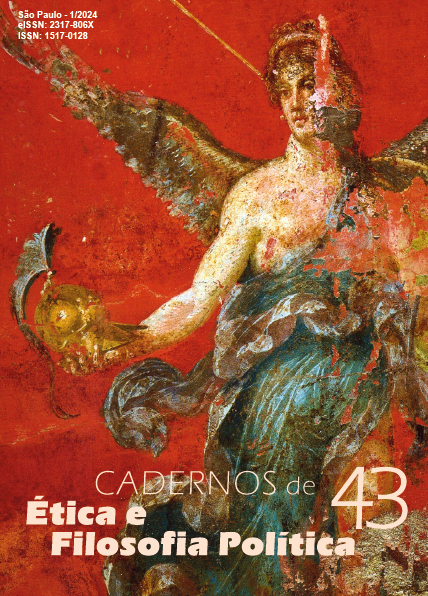The desire not to be dominated and the democratic experience in Machiavelli
DOI:
https://doi.org/10.11606/issn.1517-0128.v43i1p66-80Keywords:
Machiavelli, Conflict, People, Desires, FreedomAbstract
The conflict between the people and the grandi is central to Machiavelli’s work, as the conflicting dynamics between the desire of the people, not to be dominated, and of the grandi, to dominate, orders the social body through the institution of laws and ordinances. In this disunity, Machiavelli recognizes that the people’s desire is more reliable and in accordance with freedom, since it refuses the domination of the grandi and, therefore, does not allow freedom to be usurped. However, although the Florentine highlights the link between the people's desire and freedom, he does not clarify how the people produce laws and ordinances in favor of free life. Thus, to understand how the action of the people reorders the social body according to their desire, we will investigate the dynamics of this mood in its conflict with the great, in chapters 4 and 5 of the first book of Machiavelli’s Discourses on Livy, and we will then turn to chapter 40 of the first book of this work, as at this moment Machiavelli discusses a reorganization of Rome that opposed the common people and the nobles to understand the extraordinary action of the people and their desire in its dynamics with the desire of the grandi. Our proposal, therefore, is to show how the people reorder the city towards a democratic experience according to their desire not to be dominated.
Downloads
References
ADVERSE, Helton. “Maquiavel, a república e o desejo de liberdade”. In: TRANS/FORM/AÇÃO: Revista de Filosofia, 30 (2), pp. 33-52, 2007.
AMES, José Luiz. Conflito e Liberdade: a vida política para Maquiavel. Curitiba: CRV, 2017.
BRUM, Eliane. Brasil, construtor de ruínas. Um olhar sobre o país, de Lula a Bolsonaro. Porto Alegre: Arquipélago Editorial, 2019.
CARDOSO, Sérgio. Maquiavelianas. Lições de política republicana. São Paulo: Editora 34, 2022.
CHAUI, Marilena. “A sociedade democrática”. In: O ser humano é um ser social. São Paulo: WMF Martins Fontes, 2013.
DEL LUCCHESE, Filippo. Conflict, power and multitude in Machiavelli and Spinoza: tumult and indignation. New York: Continuum, 2009.
GAILLE-NIKODIMOV, Marie. Conflit civil et liberté: la politique machiavélienne entre histoire et médecine. Paris: Honoré Champion, 2004.
IPEA - Instituto de Pesquisa Econômica Aplicada. Atlas da violência 2023. Coordenadores: Daniel Cerqueira; Samira Bueno – Brasília: Ipea; FBSP, 2023. Acesso em 27/05/2024. Disponível em: https://www.ipea.gov.br/atlasviolencia/arquivos/artigos/9350-223443riatlasdaviolencia2023-final.pdf.
LEFORT, Claude. Le travail de l’œuvre Machiavel. Paris: Gallimard,
LEFORT, Claude. “Machiavel e la verità effetuale”. In: Écrire: à
l’épreuve du politique. Paris: Calmann-Lévy, 1992.
MAQUIAVEL, Nicolau. Discursos sobre a primeira década de Tito Lívio. Tradução MF. São Paulo: Martins Fontes, 2007.
MAQUIAVEL, Nicolau. História de Florença. Tradução MF. São Paulo:
Martins Fontes, 2007.
MAQUIAVEL, Nicolau. O príncipe. Tradução MF. São Paulo: Martins
Fontes, 2009.
MCCORMICK, Jonh P. Machiavellian democracy. New York: Cambridge University Press, 2011.
PEDULLÀ, Gabrielle. Machiavelli in tumult: The Discourses on Livy and the origins of political conflictualism. Cambridge: Cambridge University Press, 2018.
RAMOS, Silvana de Souza. “Claude Lefort e a escrita democrática”. In: Revista Discurso, 48 (1), pp. 155-166, 2018.
RICUPERO, Bernardo. O que foi o 8 de janeiro? Artigo - Jornal da USP,
Acesso em: 27/05/2024. Disponível em: https://jornal.usp.br/?p=716080.
SAFATLE, Vladimir. Insurrección e instituición: el caso chileno. CLACSO, feb-24, pp. 91-122, 2024. Acesso em 27/05/2024. Disponível em: https://biblioteca-repositorio.clacso.edu.ar/handle/CLACSO/250254.
SILVA, Ricardo. “A república democrática de Maquiavel: uma crítica à interpretação anti-institucionalista”. In: Revista brasileira de Ciências
sociais, vol. 33, n. 98, 2018.
SKINNER, Quentin. Machiavelli: a very short introduction. Oxford:
Oxford University Press, 2000.
VATTER, Miguel. Between Form and Event: Machiavelli’s Theory of Political Freedom. New York: Fordham University Press, 2014.
Downloads
Published
Issue
Section
License
Copyright (c) 2024 Ricardo Polidoro Mendes

This work is licensed under a Creative Commons Attribution-ShareAlike 4.0 International License.
Funding data
-
Coordenação de Aperfeiçoamento de Pessoal de Nível Superior
Grant numbers 001


